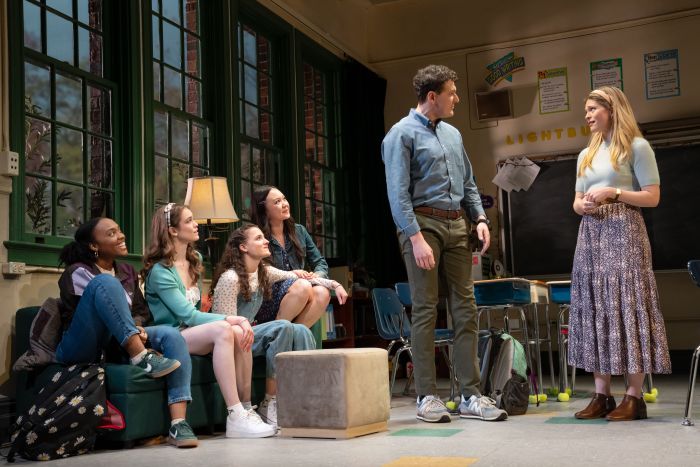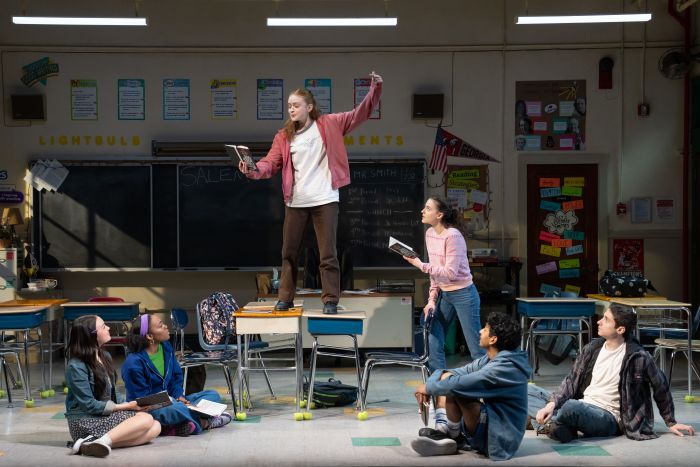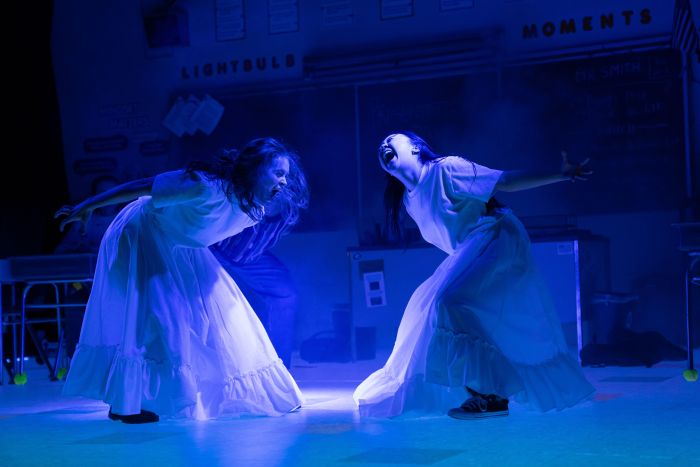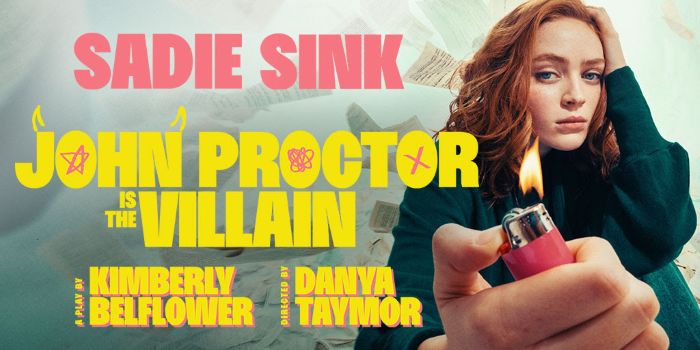It’s 2018, in small-town Georgia, and Gen Z high-school juniors (five girls and two boys) are studying Sex Ed and working on an English honors class project on The Crucible with their supportive teacher Mr. Smith. The girls have also decided to form a feminist club, with him as their faculty sponsor, when their new counsellor Ms. Gallagher declines. But incidents and allegations of sexual misconduct and abuse arise within the close-knit group, at the height of the #MeToo Movement, threatening friendships, raising questions of who can be believed, and casting a new light on the traditional interpretation of Arthur Miller’s American classic in the sharp dramatic comedy John Proctor Is the Villain by emerging playwright Kimberly Belflower, now playing a limited Broadway engagement at the Booth Theatre.

Directed by Danya Taymor with youthful passion, hysterical humor, and psychological insight, a terrific ensemble captures the high energy, speech patterns, southern accents (voice and dialect coaching by Gigi Buffington), rollercoaster of emotions, and pop culture favorites of the teen characters, as they deal with the issues inherent in school and church, friendship and dating, along with other momentous matters that no one should have to – sex scandals and broken trust – delivering both the laughs and the angst of their coming-of-age story and empowering revisionist look at the past.
Sadie Sink leads the cause as Shelby Holcomb, just returning to school after an unexplained three-month absence, a serious mistake that resulted in a severe rift with her BFF Raelynn Nix, played with an affecting sense of uncertainty by Amalia Yoo, and a big reveal that leaves the class – and the audience – reeling. Fina Strazza as the extremely studious Beth Powell, is determined to get into a good college and very appreciative of their teacher for his empathy, intelligence, and openness to the ideas of his students. Morgan Scott as Nell Shaw, a new student from Atlanta who’s trying to fit in, is adamant about her feminist views but also giddy when asked out on a date by one of the boys in the class, and Maggie Kuntz as Ivy Watkins is torn between her commitment to the group and her lifelong love for one of the men accused of sexual harassment, who becomes the subject of gossip among them.

They are joined in class by Hagan Oliveras as Lee Turner, Raelynn’s toxic ex-boyfriend who wants her back (intimacy coordination by Ann James) and explodes when she won’t (and riotously bursts into a pop hit by Taylor Swift to underscore her decision), and Nihar Duvvuri as Mason Adams, a nerdy male ally who participates in the feminist club for extra credit and maybe a chance to hang out with one of the girls. Gabriel Ebert as their teacher Carter Smith, an expectant father and the ideal of everything “the best teacher” should be, is convincingly supportive, encouraging, and caring of his students, and Molly Griggs as their newbie counsellor Bailey Gallagher is just a few years older than the students, still learning her job, and hesitant to rock the boat and antagonize the school’s administration by committing to the feminist club and being too outspoken, so maintains a low – but sly – profile.
With all the rumors, accusations, and revelations swirling around, the girls release their pent-up emotions and conflicted loyalties with a group scream, and Shelby and Raelynn recognize a parallel between the drama in their school and the one in The Crucible, realize that the old patriarchal perspective of what constitutes a hero is not compatible with their own experiences, and embody their beliefs with feminist conviction in a fervent class presentation and wild interpretive dance that conjures the falsely accused girls of the Salem witch trials and John Proctor’s forsaken wife (movement direction by Tilly Evans-Krueger) with explosive power and jubilant expression that finally gives them a voice and the “Green Light” (as in Lorde’s 2017 hit song) to present their truths – even if the powers that be still won’t believe them.

The hilarious, important, and emancipating performance is staged on a realistic set (by AMP, featuring Teresa Williams) of a typical classroom in a rural “one stoplight” town, enhanced between scenes and in the final dance with surreal lighting (by Natasha Katz) and sound (by Palmer Hefferan), and projections by Hannah Wasileski. Costumes (by Sarah Laux) and hair, wigs, and make-up (by J. Jared Janas) authentically capture the casual look of post-modern high-school students, the more traditional dress of their teacher, and the white dresses of the characters of The Crucible as portrayed by Shelby and Raelynn.
While some of the plot lines defy credibility (the high number of cases of sexual impropriety among this small group of nine characters exceeds those of statistical data; the likelihood of a teenager forgiving a best friend who hurt her deeply and has proven she can’t be trusted is questionable), but the outstanding cast, laugh-out-loud contemporary humor, and weighty message of John Proctor Is the Villain make it an extremely entertaining and relevant must-see show.
Running Time: Approximately one hour and 50 minutes, without intermission.

John Proctor Is the Villain plays through Sunday, August 31, 2025, at Booth Theatre, 222 West 45th Street, NYC. For tickets (priced at $99-399, including fees), go online or visit TodayTix here.



